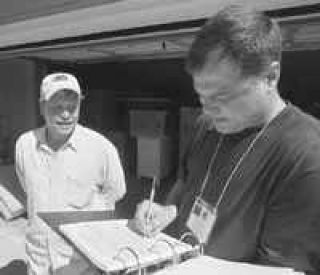SNOQUALMIE – The Snoqualmie firehouse, which is doubling as the city’s census headquarters, has been home to a flurry of activity over the past two weeks, as workers clad in electric-blue shirts raced to count residents one block at a time.
At least 30 city employees set projects aside and joined a handful of local volunteers to go door to door and answer phones in an effort to correct an apparent miscount of Snoqualmie’s population contained in the 2000 Census.
“Its going really, really well, and the citizens are participating at an extremely high level,” said Rhonda Montgomery, city permit administrator and census coordinator. By the end of last week, after only five days of counting, enumerators had knocked on 100 percent of the city’s doors. The theme for the recount is, “You Count in Our Count.”
“Residents have been very happy to see us,” said Jeanne Lamon, city employee. “Most of them will come to the door and say, ‘Oh, census. We wondered when you were coming by.'”
The reason for the new census is to keep the city from losing out on funding as a result of the low count conducted by the federal Census Bureau last year. The 2000 Census recorded Snoqualmie’s population at 1,631, which is about 714 people short, according to city officials. They estimate the city’s population to be 2,345.
If the city were to accept the federal census count, it would lose revenue – about $22,000 a year – and that would impact city-provided services, such as police, fire, parks and street maintenance.
Once the recount is complete, the new figures will go to the state Office of Financial Management (OFM), the agency responsible for giving Snoqualmie some of the money it receives from the state of Washington. If OFM agrees with the new data, the state will recognize the population total and restore funding to the city. However, it will not refund money that Snoqualmie has already lost because of the low Census 2000 count.
While the state may accept a new count, the Census Bureau will not. Federal officials say cities disputing their 2000 Census count – about 30 in the state of Washington so far – must follow its Census Question Resolution program, which begins this summer and ends in 2003. In that program, cities can provide geographic data, such as maps, to the Census Bureau, which will then decide whether it left an area out of a city’s count.
Now that they have completed the door-to-door process, city workers will answer a special census phone number for those who weren’t home or haven’t been counted. The city is asking residents who have not been counted to call (425) 888-7791. Those who know of neighbors on vacation should also call the hotline.
“They need to call by May 4,” Montgomery said. “We need the information ASAP. The sooner we have it, the sooner we can tally.”
Officials will compile the information and must turn it in by May 14. The city expects to have an accurate and final count by that date, but it could take some time for other government entities, such as the county, to accept the new number.
The cost to conduct Snoqualmie’s census could reach into the thousands, not only because projects have been delayed, but because supplies were purchased and phones set up in preparation of the recount.
Councilwoman Colleen Johnson said the city had no choice but to delay projects because the count must be completed by May 5. When asked about the difficulties involved in the city conducting its own count, she responded, “You ever try to push a snail uphill?”
Many census workers spent an average of 11 hours a day walking city neighborhoods. Some even worked at their city jobs for a few hours each day, then spent several more hours counting residents. Once neighborhoods were counted, the figures were amassed and categorized by volunteers at census headquarters.
The cost to the city won’t end with the recount.
“Besides working long hours now, I’ll have to work just as many hours when I get back, just to catch up,” said Jodi Warren, city clerk.
The city’s census questions are simple compared to federal forms because the city is only interested in the physical address of the home, the number of housing units, the names of people living there and if the family lived at that location in April 2000.
For those who weren’t at home during the recount, enumerators left bright yellow tags on doors, and city officials hope those who received a tag will take the time to respond.
“It only takes a couple of minutes and it means so much, not only for funding for the city, but to the citizens because it provides a fair representation for us at the legislative level,” Warren said, referring to the fact that the state uses census numbers to determine legislative boundaries. “If the population is not fairly counted, then it’s not fairly represented.”
As for the collected information’s confidentiality, residents shouldn’t worry, Montgomery said.
“We want citizens to know we are not affiliated with the federal census, and we don’t have access to last year’s census information,” Montgomery said. She explained that enumerators for the city are not there to spy on residents or otherwise seek detailed information, such as Social Security numbers or birthdays for those living at the house.


